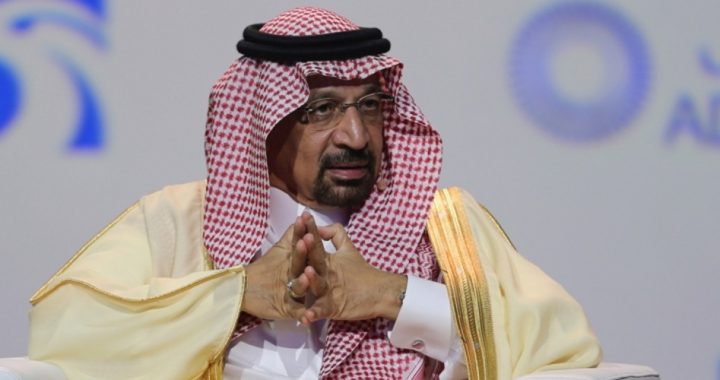
Coming out of the emergency meeting by OPEC in Abu Dhabi over the November 10 weekend, Saudi Arabia’s Energy Minister Khalid al-Falih (shown) claimed that when the cartel meets officially on December 6 in Vienna, it will “do whatever it takes to balance the oil market.”
That was before evidence of Saudi Arabia’s involvement in the murder of journalist Jamal Khashoggi in early October surfaced. Now the Saudis are faced with trying to “balance” not only global oil market but also their now highly strained relationship with the United States.
President Trump had called on the Saudis to lower oil prices as world crude oil prices moved higher in advance of the sanctions coming on Iran in November. On October 3, the day after Khashoggi was assassinated, American oil prices hit $76 a barrel. When waivers were granted to Iran, oil prices tumbled. With increasingly persuasive evidence that China’s economy is slowing more rapidly than originally thought, and U.S. crude oil production continuing to set and break records, the political and economic realities are leaving OPEC and its primary producer, Saudi Arabia, with few options.
In other words, the threat to do “whatever it takes” now rings hollow. If Saudi Arabia is somehow able to persuade other members of the cartel to reverse position and cut production — rumored to be as much as 1.4 million barrels a day — it will have at least two impacts: American producers will happily take market share away from the cartel by making up the difference, and President Trump will happily tweet his displeasure if oil prices start to rise again.
If they continue to produce as if the Iranian sanctions hadn’t been compromised with those waivers, oil prices will drop further. At the close of business on Friday, crude oil for January delivery was priced a $50.39 a barrel, down from $76 a barrel just six weeks earlier.
OPEC’s emasculation of its former influence and ability to direct global oil markets to its own benefit is being hastened not only by political events (some of its own doing) and America’s increasing crude oil production but also by the announcement on Thursday by BP (British Petroleum) that it had started production from its Shetland Island site, called its Clair Ridge project. Its initial goal is the delivery of 120,000 barrels a day from that North Sea site, while its ultimate goal is a million by no later than 2021, a scant two years away.
Once the new and revamped pipelines are completed, American production from the Permian Basin and Eagle Shale oil fields will allow another four million barrels a day to flow into world markets by no later than 2020.
All of which was summed up nicely by Eugen Weinberg, head of commodities research at Germany’s Commerzbank: “The imminent OPEC meeting in Vienna is unlikely to provide massive support this time around because of the troubling situation in and around Saudi Arabia.” Translation: OPEC is likely to do nothing at its meeting Vienna, allowing crude oil prices to fall even further.
Photo of Khalid al-Falih: AP Images
An Ivy League graduate and former investment advisor, Bob is a regular contributor to The New American magazine and blogs frequently at LightFromTheRight.com, primarily on economics and politics. He can be reached at [email protected].
Related article:



